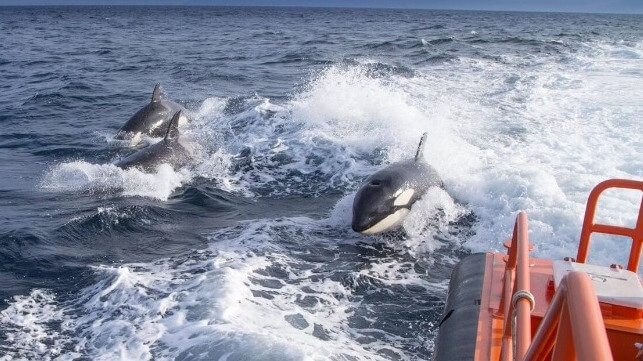Sailboat Suffers a Damaged Rudder and a Water Leak in Orca Attack

Orcas have developed a habit of playing with sailboats along the coast of Spain, to the annoyance of the European yachting community. Sometimes the encounter is remarkable but harmless; sometimes it results in real damage, as it did for the German-flagged sailboat Meu off the coast of Cape Touriñán last week.
While the Meu was under way about four miles off Cape Touriñán, the 16-meter sailing yacht encountered a group of orcas. The killer whales rammed the boat's rudder, as is common in this region, but they also showed an interest in hitting its daggerboard, the crew told La Voz de Galicia.
The run-in left the rudder broken and the vessel leaking. The five-member crew called for help from Spanish lifesaving service Salvamento Maritimo, which helped provide a tow to a nearby seaport. No injuries were reported, and the vessel is awaiting repairs.
Dozens of orca interactions (of varying severity) are reported around the coast of Spain every month, including nearly 20 that have occurred off the northwestern coast since mid-August. That number includes two back-to-back attacks in the Bay of Biscay, far further to the east than previous incidents.
The frequency of the interactions has increased every year since the first incidents were reported in 2020, and some of the more recent run-ins have ended in sinkings. The attacks have a specific pattern: the orcas always target the rudder, and they bump it to swing the boat through a wide arc. Not all attacks end in damage, and of those that do, a rudder failure is almost always the outcome.
The vessels targeted are always sailboats of about 15 meters or less, including monohulls and multihulls. Local fishermen report that diesel-engined workboats - with smaller, differently-shaped rudders - are always left alone, even though the orcas will come within a few yards to chase fish.

that matters most
Get the latest maritime news delivered to your inbox daily.
Marine scientists with research center CIRCE have identified a handful of individual orcas who are believed to be responsible for the run-ins. There are two competing theories for the motive behind ther behavior. The first, suggested by biologist Alfredo López Fernández of the University of Alviedo, is that an orca was injured by a vessel at some point in the past and its family is taking revenge. The second, proposed by researchers at CIRCE, is that it is little more than a form of play or socialization for one orca family pod - a "fad," according to Monika Wieland Shields, director of the Orca Behavior Institute.
The interactions have caused a lot of property damage, but so far the risk to life appears limited to the hazards of a marine casualty - not predation or intentional harm. There has never been a documented case of a human dying from an orca attack in the wild.
